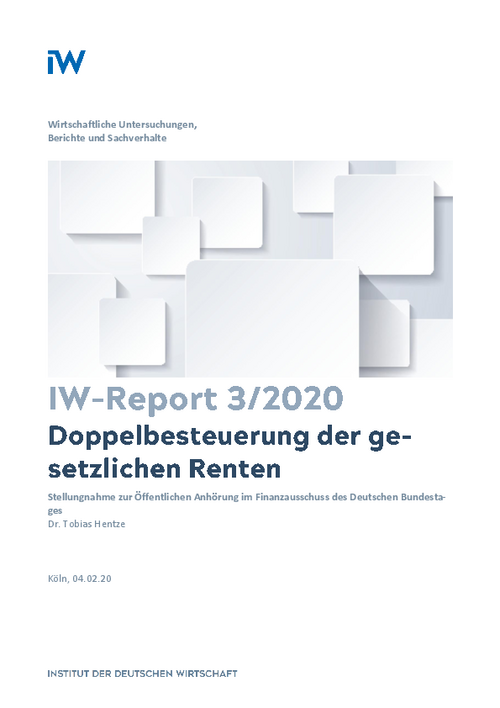The move to a subsequent taxation of statutory pensions will be completed in 2040 according to current tax law. By then, the taxable portion of the statutory pension will increase to 100 percent for new pensioners, while the tax deductibility of the pension contributions will increase to 100 percent by 2025.

Statement on the Public Hearing in the Finance Committee of the German Bundestag: Double Taxation of Statutory Pensions
IW-Report

The move to a subsequent taxation of statutory pensions will be completed in 2040 according to current tax law. By then, the taxable portion of the statutory pension will increase to 100 percent for new pensioners, while the tax deductibility of the pension contributions will increase to 100 percent by 2025.
According to the requirements of the Federal Constitutional Court, there must be no double taxation of statutory pensions as part of the system change. Double taxation occurs if pension payments, which were financed by taxed pension contributions, are taxed again in the payment phase.
A comparison of the pension contributions paid from taxed income with the pension-free amount for typified employees shows that, starting with the current retirement years, there is double taxation of pensions over around 40 years. The legislator could minimize the cases of double taxation by slowing the increase in the taxable portion of the pension from 1 percentage point to 0.5 percentage points per year and, at the same time, allowing immediate, full deductibility of the pension contributions. This would not interrupt the adjustment process, but would reduce double taxation and even largely avoid it from 2030.
However, such a move would lead to tax losses from the state's perspective. Therefore, the legislator might compensate for this shortfall, for example by increasing other taxes.

Tobias Hentze: Doppelbesteuerung der gesetzlichen Renten – Stellungnahme zur Öffentlichen Anhörung im Finanzausschuss des Deutschen Bundestages
IW-Report

More on the topic

Expenditures and Revenues in Germany’s Statutory Health Insurance
Almost annually recurring deficits in Germany’s statutory health insurance system have led to a steady rise in the contribution rate, a percentage of earned income.
IW
Changing Germany's Statutory Pension Insurance: An Empirical Study of Popular Aversion to Reforms
The demographic transition is putting the German statutory pension insurance system under enormous pressure to reform. Despite widespread concern, no reform of the adjustment mechanisms incorporated into the pension system meets with the approval of a majority ...
IW